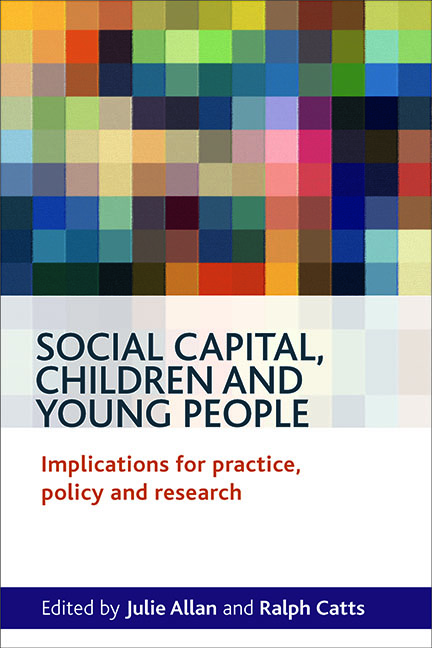twelve - Social capital for young people in educational and social policy, practice and research
Published online by Cambridge University Press: 01 September 2022
Summary
As was explained in the introductory chapter, the contributors to this publication were members of the Schools and Social Capital Network, within the Scottish Applied Education Research Scheme, which was supported with research grants from the Scottish Government and the Scottish Funding Council. Through the course of this research, they developed a shared understanding of what social capital meant in the context of schools and their communities, and this is evident in the consistency with which social capital is described in the various chapters of this book. We began with Fukuyama's definition of social capital (1995), which underlined the centrality of trust. We problematised the notion of trust and, along with Uslaner (2002), recognised it as a separate construct, but concluded that it is an essential ingredient for social capital to contribute to well-being and attainment in schools, and is also essential to enable research into the effects of social capital.
The contributors have taken a critical view of the notion of social capital, both in relation to its utility as a construct and in terms of the extent to which it could address the multiple causes of deprivation and disadvantage in society. Both Arshad and Maclennan (Chapter Eight) and MacBride in his commentary (Chapter Six) argue that while enhanced and enriched networks could provide opportunities for young people, such networks could not overcome a lack of economic resources and infrastructure. The pervasive influence of poverty on individuals and upon school communities (Battistich et al, 1995) remains a fundamental barrier to inclusion in educational practices and equity in the outcomes of education. Further, to enhance existing networks and to enrich them with new sources of information requires funding to enable opportunities for youth workers, teachers and community workers to engage with community networks. This is important because from the perspective of young people, the multiple networks within schools were not the only, or necessarily the most important of, their social networks.
- Type
- Chapter
- Information
- Social Capital, Children and Young PeopleImplications for Practice, Policy and Research, pp. 209 - 226Publisher: Bristol University PressPrint publication year: 2012

